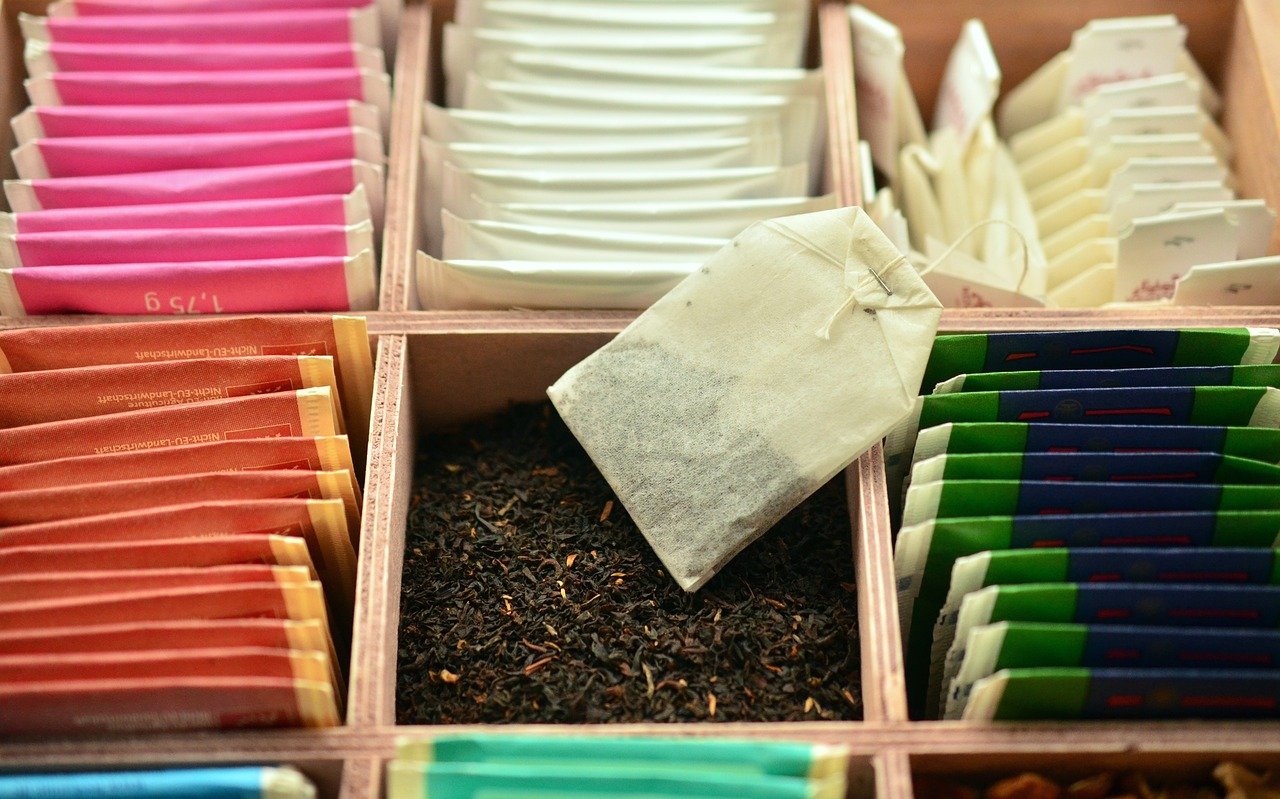You can compost tea bags, provided they are not made of plastic and do not include any metal. They need to be made of biodegradable materials.
Before throwing that compost tea brew bag into your compost bin, ask yourself this question: can you compost tea bags?
To answer this, you might want to determine whether it contains biodegradable ingredients.
While it is ok to compost tea bags, firms produce many sachets with trace amounts of plastic or small pieces of metal staples, which you cannot put into your compost bin. That prevents the tea from being composted.
Learn more on whether you can compost tea brewing bags. We also give you a list of brands that produce eco-friendly tea bags for your compost pile.
Table of Contents
What To Know About Composting Tea Bags
Can you compost tea bags? The answer is yes with a but. There are a few factors to consider to get the desired results of healthy soil.
When you add used tea bags to your compost bin, the moist tea leaves accelerate the composting process. That makes them beneficial.
Note that the components that make up the tea bags significantly affect how quickly they decompose. Also, they determine whether the tea bags are compostable.
1. Is the Sachet Biodegradable?

Before adding your used tea bags to your home compost, check to see if the sachets contain biodegradable materials.
Experts estimate that between 20 and 30% of tea bags currently available on the market comprise polypropylene, which cannot be composted. Therefore, the components that make up your compost tea bags should include nothing harmful to the environment.
Polypropylene is a synthetic substance that is quite similar to plastic. Tea bags comprising polypropylene are usually slippery if you can feel them on your fingers. That is because their edges are also heat-sealed.
If your used tea bags include this synthetic material or any other chemical, you should know that it is not safe for your healthy soil. They also don’t contribute to adding plant nutrients.
2. Use Compostable Sachets
Compostable sachets comprise materials like organic cotton, hemp, muslin, paper, silk, or other plant fibers and papers. There aren’t any dangerous chemicals to destroy the beneficial microbes.
The sachets must have no traces of plastics so that the organic material won’t get tainted, and neither will the bins or containers used for composting. When composting food waste at home, use only the bags that meet this criterion.
If you are confused about whether your types of tea bags are compostable, we recommend you slice open the sachets, empty their contents into your compost pile, and then throw away the bag.
3. Use Micron Tea Bags
Alternatively, you can use the micron tea bag. Micron compost tea bags allow various microbes to move freely from your compost to the compost tea.
Another addition you can include is adopting worm castings to help you.
How Long Does It Take To Decompose a Tea Bag?
It takes anywhere from 3 months to 6 months for tea bags to decompose. But, of course, that depends on your soil type, the temperature throughout the year, and how deep you bury the tea bags.
During the decomposition of organic compounds, water is an essential component. Because of this, decomposition begins when you put the tea bag in hot water.
Then, in the compost pile, organisms like fungi and bacteria and bigger species like worms continue decomposing your used tea bag in a mixture of solid matter and chemicals like carbon dioxide.
What Types of Tea Bags to Compost
1. Understanding PLA: Polylactic Acid
Before we start, we’d like to ensure you are familiar with one terminology surrounding tea bags.
You will encounter a great deal of conversation around PLA. The term “PLA” is an abbreviation for Polylactic Acid.

Since PLA tea bags are created from plant-based plastics, technically speaking, we cannot classify them as plastic-free. We can classify them under bioplastic materials.
Concerning the PLA, there are a few problems. For starters, the plant materials used in producing PLA may come from crops subjected to genetic modification (GM).
Second, PLA tea bags are not suitable for your backyard composting. So you want to ensure you dispose of the tea bags correctly.
Composting will move forward fast if your local council gathers your garbage cans filled with food waste and yard debris for industrial composting. If it doesn’t, then your PLA tea bags will be no better than the conventional plastic tea bags.
2. No Polypropylene
We’ve established that you should not throw plastic into your compost bin. Even though you wouldn’t assume tea bags contain plastic, some manufacturers seal the tea bags together in one piece by using polypropylene – which is not safe to compost tea leaves.
When looking for compostable tea bags, watch for the following criteria.
They should have:
- No plastic sealants
- They should be 100% plant-based materials
- Zero staples
What About Tea Bag Packaging?
When you buy a box of tea bags from your favorite brand, you can shred or recycle the box and put it inside your compost bin. But there are also tea bags packaged in aesthetically pleasing sachets.
Even though the tags on the tea bags are biodegradable (because of the use of printing inks created from vegetables), the sachets are made of plastic or foil.
Because of this, you could end up with a compostable tea bag wrapped inside a non-recyclable sachet.
7 Plastic-Free Tea Brands
The following brands manufacture compostable tea bags that do not contain plastic, and we can add them to our compost without worry.
Note: You should always double-check the brands because companies upgrade their products with time.
Among these brands are:
- Abel & Cole’s own brand
- Waitrose Duchy range
- PG Tips
- Clipper
- Twinings pyramid range
- Teapigs
- Pukka Herbs
How to Compost Tea Bags in 5 Steps
To compost your tea bags, follow the steps below:
- You can begin by potting your tea bag or preparing loose leaf tea.
- After the steeping process is complete, remove the compostable tea bag or loose tea leaves from the cup or pot, then put them aside.
- You can put the tea bag you have steeped in any container you have for keeping food waste before they are composted, like a compost bin or a bucket.
- Next, allow your steeped tea leaves or tea bags to cool.
- Put the tea leaves you’ve steeped and any compostable bags inside your backyard compost pile.
Coffee Grounds/Tea Bags Compost
Making compost from used tea bags and coffee grounds is another alternative. You want to add your compostable tea plus the used tea bags to the compost pile. You don’t need to do anything else for decomposition to start.
That’s because the worms responsible for decomposing coffee compost also decompose the tea leaves and any other items you may include in your backyard compost.
The composting process works the same way in your kitchen compost bin, the pile in the garden, or even your yard composting barrel, provided you’ve composted coffee grounds. You can modify the procedure to be as complex as you want.
The bottom line is that tea integrates well with whichever composting system you use and tea compost is excellent for plant and soil structure.

